A well-optimized website can generate more traffic, attract potential customers, and increase revenue. However, despite the wealth of information available on SEO best practices, many businesses still fall into common traps that harm their rankings instead of improving them. In this comprehensive guide, we will explore the most common SEO mistakes, why they’re problematic, and how to fix them.
By understanding these SEO errors and avoiding them, you can ensure your website stays on the path to better search visibility and sustained organic growth.
SEO Mistakes Overview
SEO is not a one-time task; it’s a continual process that evolves with search engine algorithms, user behaviors, and market trends. As a small business owner, it’s easy to overlook certain aspects or implement outdated practices in an attempt to boost your site’s rankings. The problem is that many seemingly small mistakes can have a big impact on how search engines view your site.
Let’s start by exploring why these mistakes are detrimental.
- Lost Rankings: Google and other search engines penalize websites that violate their guidelines. Common mistakes may result in reduced visibility or lost rankings, affecting your site’s ability to drive organic traffic.
- User Experience: Some SEO mistakes degrade the user experience (UX), and since search engines prioritize UX, this can reduce rankings.
- Revenue Loss: Fewer organic visitors mean fewer potential customers, impacting revenue.
- Wasted Resources: Spending time and money on ineffective SEO strategies wastes valuable resources.
By avoiding the most common SEO mistakes, you can position your business for better visibility and long-term success.
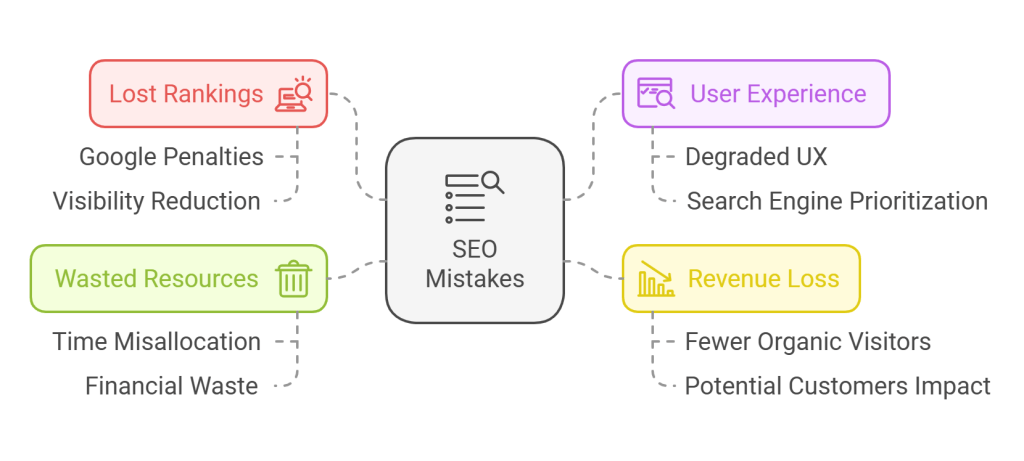
Common SEO Mistakes to Avoid
Now, let’s dive into the SEO mistakes that hurt your rankings and how to address them effectively.
1. Ignoring Mobile Optimization
In today’s mobile-first world, optimizing your website for mobile devices is no longer optional. Mobile devices now account for over half of global web traffic. Ignoring mobile optimization is one of the biggest SEO mistakes you can make.
Why It Hurts Your SEO: Google uses mobile-first indexing, meaning it primarily uses the mobile version of a website to determine its ranking. If your site isn’t optimized for mobile, you risk poor rankings and bad user experience.
Solution:
- Ensure your website is responsive, meaning it adapts to different screen sizes.
- Use Google’s Mobile-Friendly Test tool to check if your site is mobile-optimized.
- Simplify navigation on mobile, reduce pop-ups, and make sure buttons and links are easy to tap.
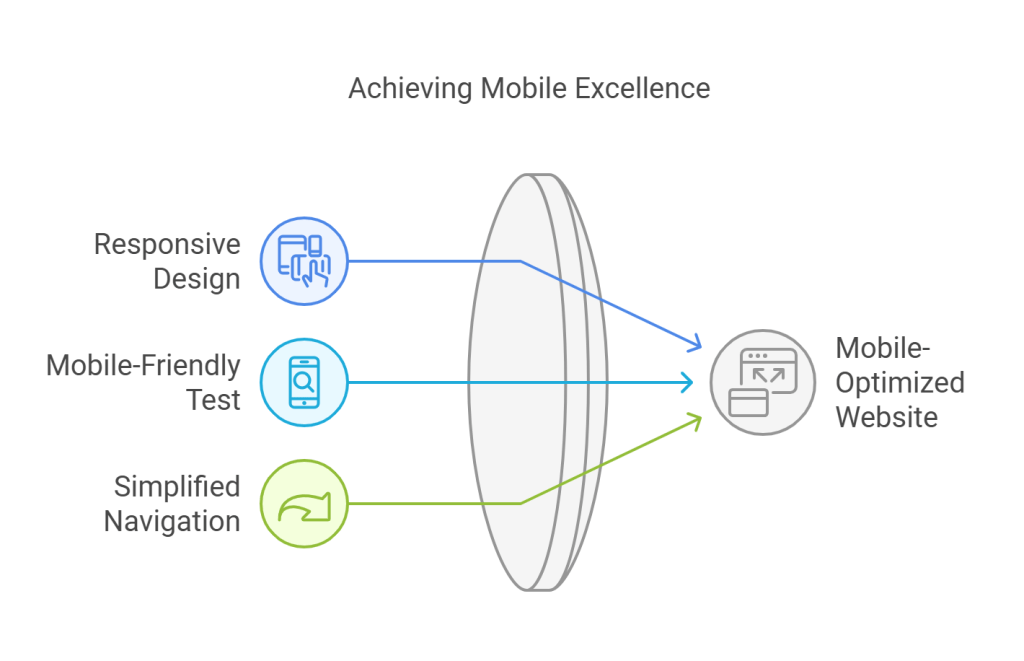
2. Failing to Conduct Keyword Research
Many small business owners assume they know which keywords their target audience is searching for, but failing to back this up with data is a major SEO mistake. Using irrelevant or overly broad keywords can lead to poor search rankings and irrelevant traffic.
Why It Hurts Your SEO: Search engines rely on keywords to match users’ search intent with your content. If you’re targeting the wrong keywords, search engines will struggle to connect your site with relevant queries.
Solution:
- Use tools like Google Keyword Planner, SEMrush, or Ahrefs to conduct proper keyword research.
- Focus on long-tail keywords, which are often less competitive and more aligned with specific user intent.
- Regularly update your keyword list based on trends, industry changes, and competitor analysis.
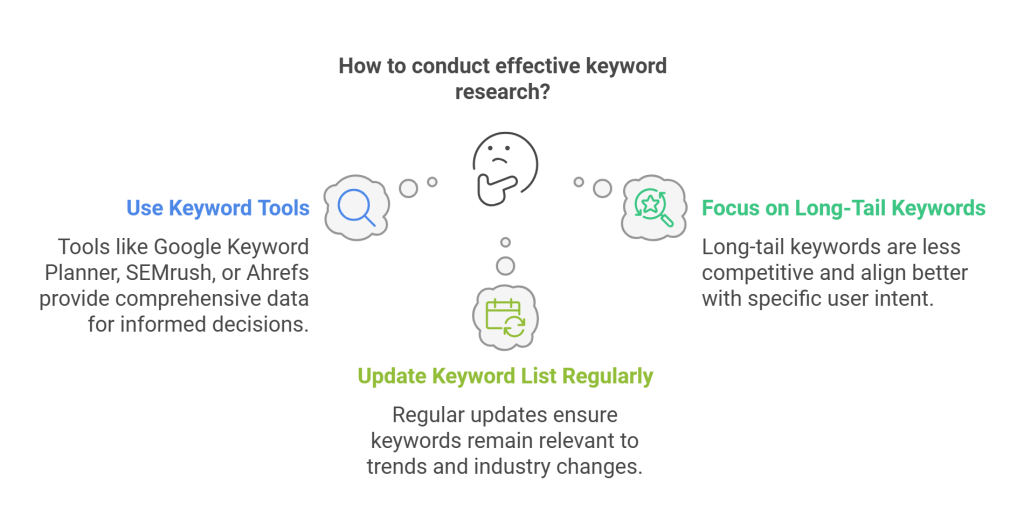
3. Keyword Stuffing
Using keywords is crucial, but overusing them – known as keyword stuffing – is a harmful practice. In the early days of SEO, stuffing pages with as many keywords as possible was a popular tactic, but search engines now penalize this approach.
Why It Hurts Your SEO: Keyword stuffing leads to an unnatural, spammy user experience and can result in penalties from search engines, which now emphasize context and content quality over keyword density.
Solution:
- Focus on writing naturally for your audience and incorporate keywords where they make sense.
- Use synonyms and related terms to create variety and improve readability.
- Use keyword density tools to ensure you’re not overusing your target keywords.
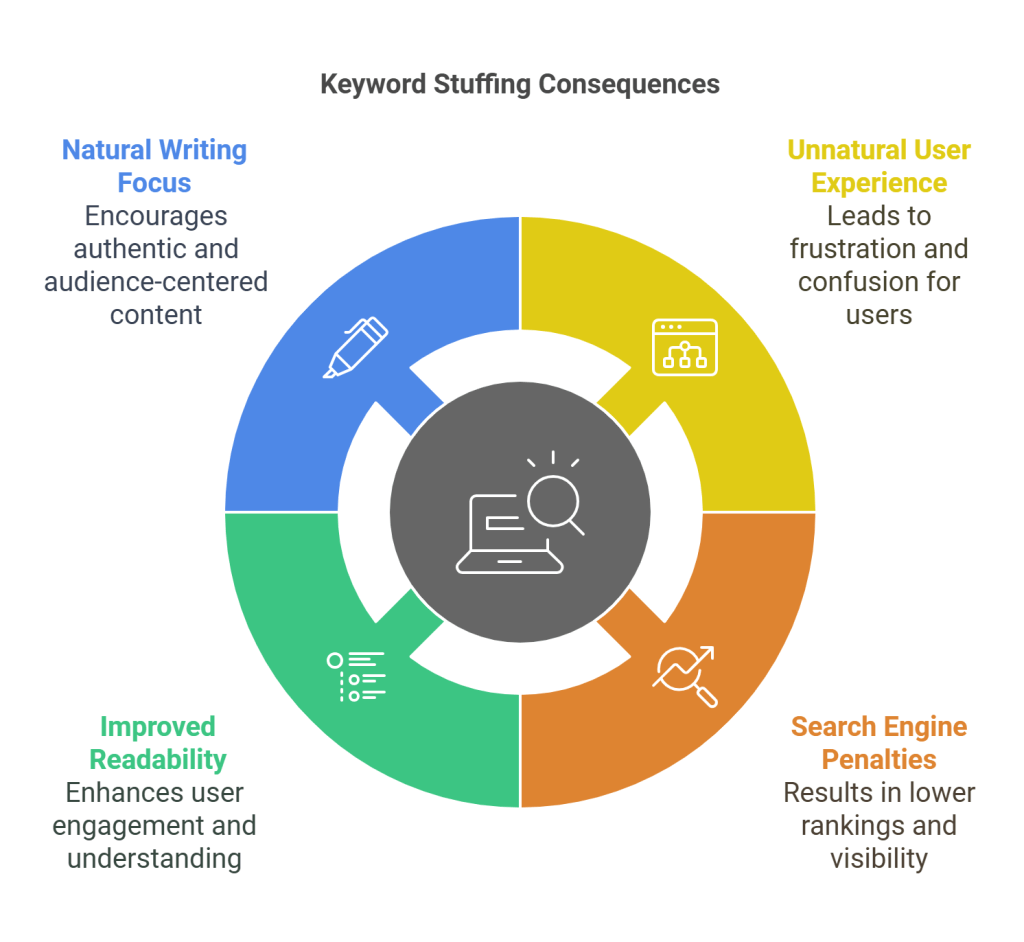
4. Neglecting Title Tags and Meta Descriptions
Title tags and meta descriptions are two fundamental elements of on-page SEO. Many businesses either overlook them completely or use generic text that fails to attract clicks.
Why It Hurts Your SEO: Title tags and meta descriptions are what users see in the search engine results pages (SERPs). If they’re missing, duplicated, or irrelevant, they can reduce your click-through rate (CTR), ultimately lowering your rankings.
Solution:
- Write compelling and unique title tags for each page (aim for 50-60 characters).
- Craft descriptive and engaging meta descriptions (around 150-160 characters) that align with the user’s search intent.
- Include relevant keywords, but make sure the text reads naturally.

5. Publishing Low-Quality Content
Content is still king, but not all content is created equal. A big mistake is publishing thin, duplicate, or poorly written content in the hopes of ranking quickly. Google’s algorithm values content that is informative, unique, and relevant to the search query.
Why It Hurts Your SEO: Low-quality content not only drives away users but also signals to search engines that your site doesn’t provide valuable information. This can result in poor rankings or even penalties from Google’s Panda algorithm.
Solution:
- Focus on creating high-quality, original content that answers user queries in-depth.
- Regularly update your existing content to keep it relevant.
- Use multimedia elements (images, videos, infographics) to enhance user engagement.
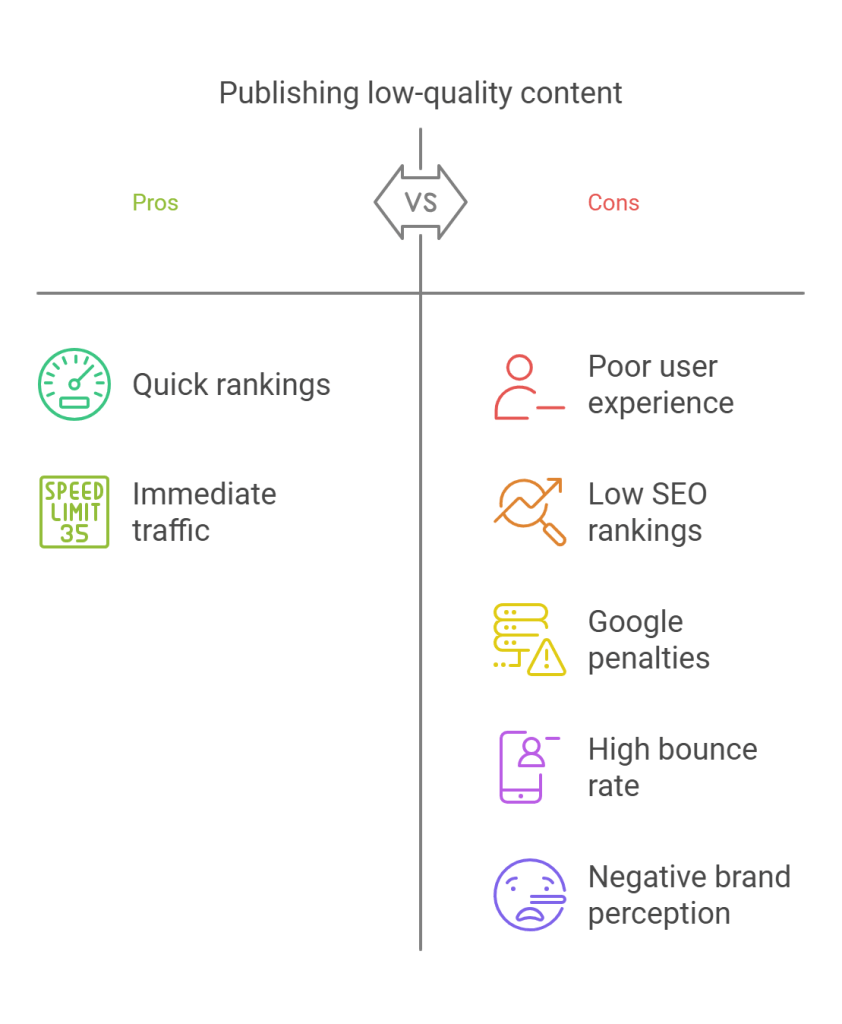
6. Ignoring Local SEO
If you’re a small business with a local customer base, ignoring local SEO is a critical mistake. Many small businesses fail to optimize their site for location-specific searches, which are increasingly important in today’s SEO landscape.
Why It Hurts Your SEO: Local searches, such as “near me” searches, have exploded in recent years. If your business isn’t optimized for local search, you’re missing out on a significant traffic source.
Solution:
- Create a Google My Business (GMB) profile and ensure it’s fully optimized with your business name, address, phone number, and business hours.
- Include local keywords in your content and meta tags (e.g., “best bakery in Austin”).
- Collect and manage online reviews, which impact local search rankings.
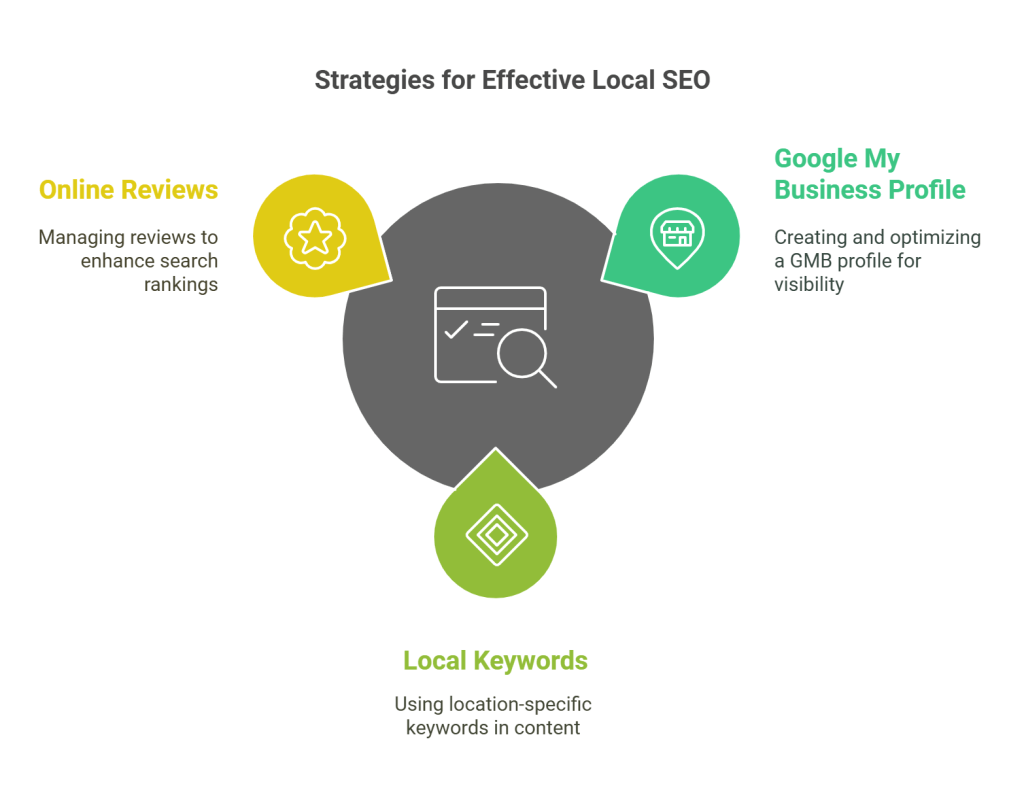
7. Ignoring User Experience (UX)
SEO isn’t just about keywords and backlinks; user experience (UX) plays a crucial role in how search engines rank your site. If visitors find your website difficult to navigate, slow, or unappealing, it can hurt your rankings.
Why It Hurts Your SEO: Google measures how users interact with your site, and poor engagement metrics (such as a high bounce rate or low time on site) signal that your content isn’t valuable or your site is difficult to use.
Solution:
- Improve site speed by optimizing images, using a reliable hosting provider, and minimizing CSS and JavaScript files.
- Make sure your website design is clean, intuitive, and easy to navigate.
- Use internal linking to help users find relevant content on your site and keep them engaged longer.
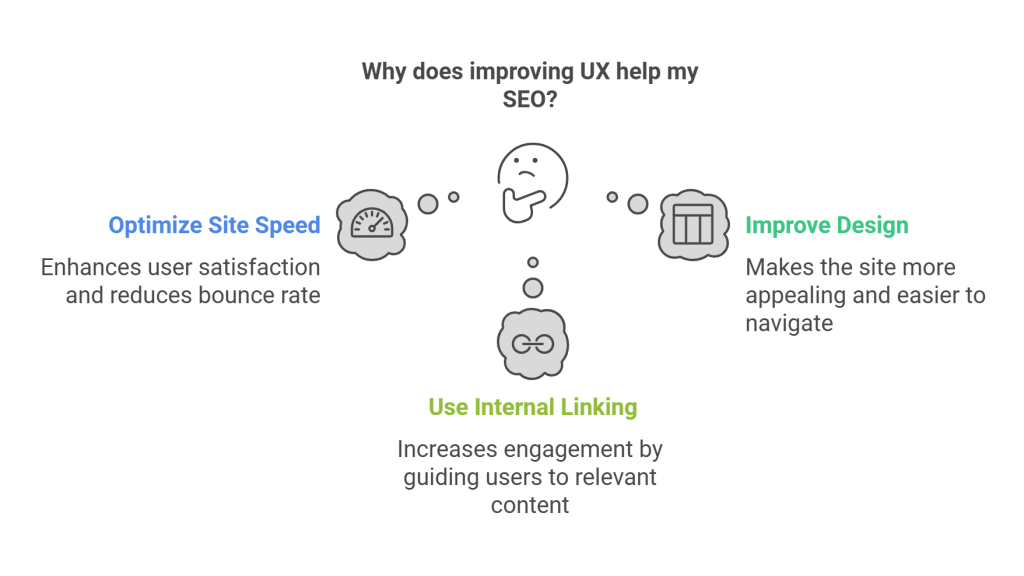
8. Not Optimizing for Voice Search
Voice search is becoming more prevalent with the rise of smart speakers and voice assistants like Siri, Alexa, and Google Assistant. Neglecting to optimize for voice search can limit your reach as more users turn to voice commands to search for information.
Why It Hurts Your SEO: Voice search queries tend to be more conversational and longer than text searches. Without optimizing for these nuances, you might miss out on ranking for voice search queries, which are becoming increasingly common.
Solution:
- Target long-tail keywords and phrases that mimic conversational language.
- Create content that directly answers common questions (e.g., starting sentences with “what,” “how,” and “why”).
- Optimize your content for featured snippets, as these are often used as answers in voice search results.
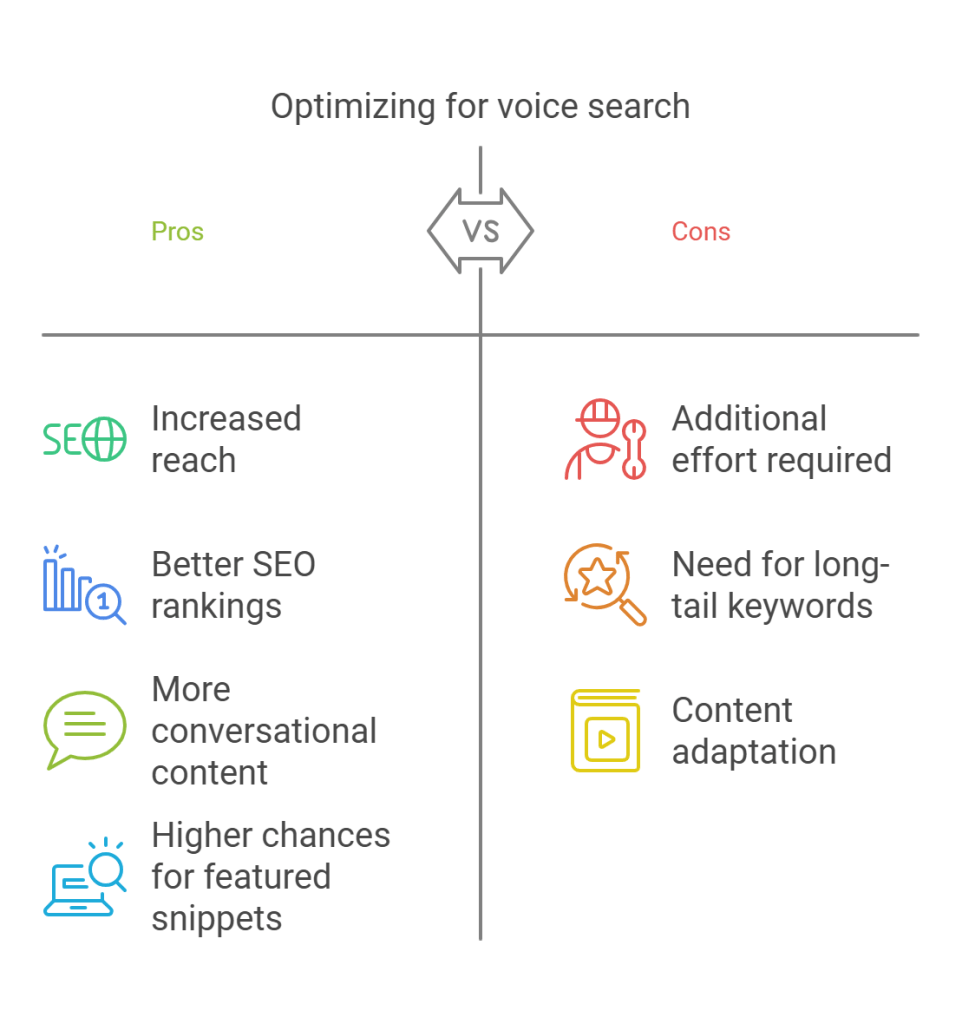
9. Neglecting Backlinks
Backlinks – links from other websites to your own – remain one of the most important ranking factors in SEO. However, some businesses neglect building backlinks or engage in harmful practices like buying low-quality links.
Why It Hurts Your SEO: Search engines use backlinks to gauge your site’s authority and trustworthiness. If your site lacks quality backlinks or has too many spammy links, it can significantly harm your SEO efforts.
Solution:
- Focus on earning backlinks from reputable websites in your industry through guest blogging, partnerships, and high-quality content creation.
- Use tools like Ahrefs or Moz to monitor your backlink profile and disavow any harmful links.
- Avoid paying for backlinks or using link schemes, as these can result in severe penalties.
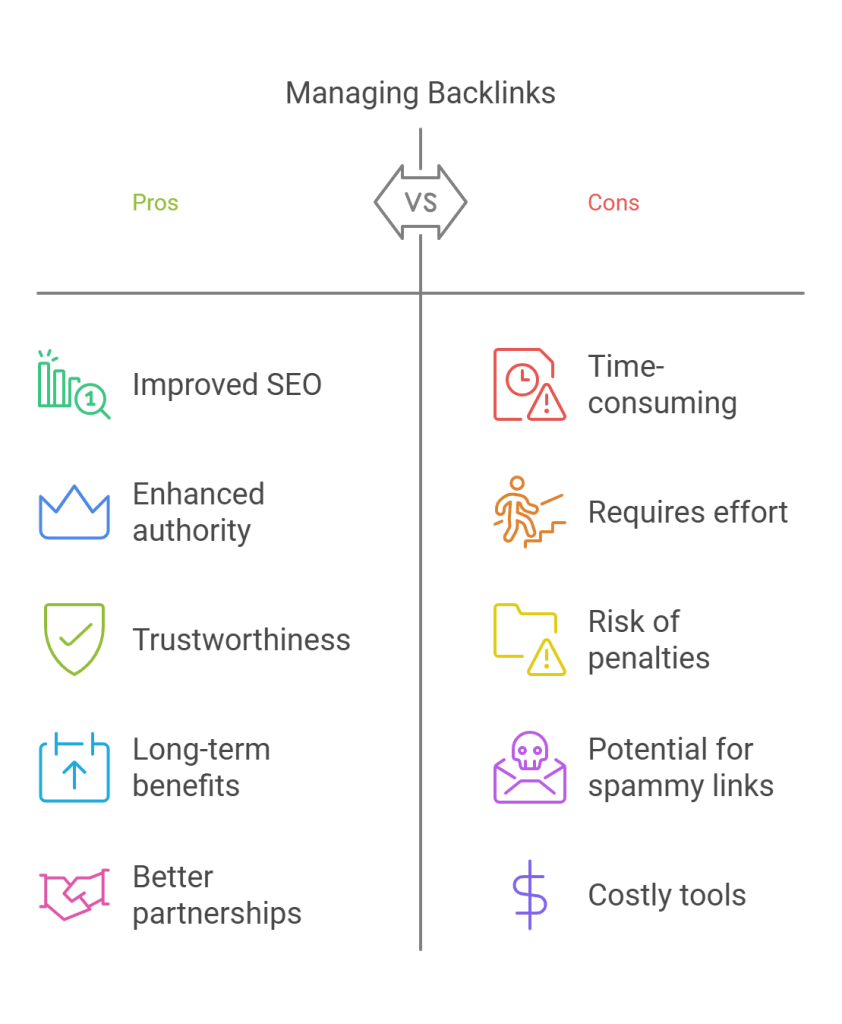
10. Focusing Only on Rankings
While it’s important to track your rankings, many businesses focus too much on this one metric, ignoring other key performance indicators (KPIs). Rankings alone don’t tell the full story of your SEO efforts.
Why It Hurts Your SEO: Focusing solely on rankings can lead to missing out on other important SEO metrics like organic traffic, bounce rate, conversion rate, and user engagement. These metrics provide a better understanding of how users interact with your site and the effectiveness of your SEO strategy.
Solution:
- Track a range of SEO metrics, including organic traffic, time on site, bounce rate, conversion rate, and click-through rate (CTR).
- Use Google Analytics, Search Console, and other SEO tools to get a complete picture of your website’s performance.
- Prioritize user experience and conversions over rankings alone.
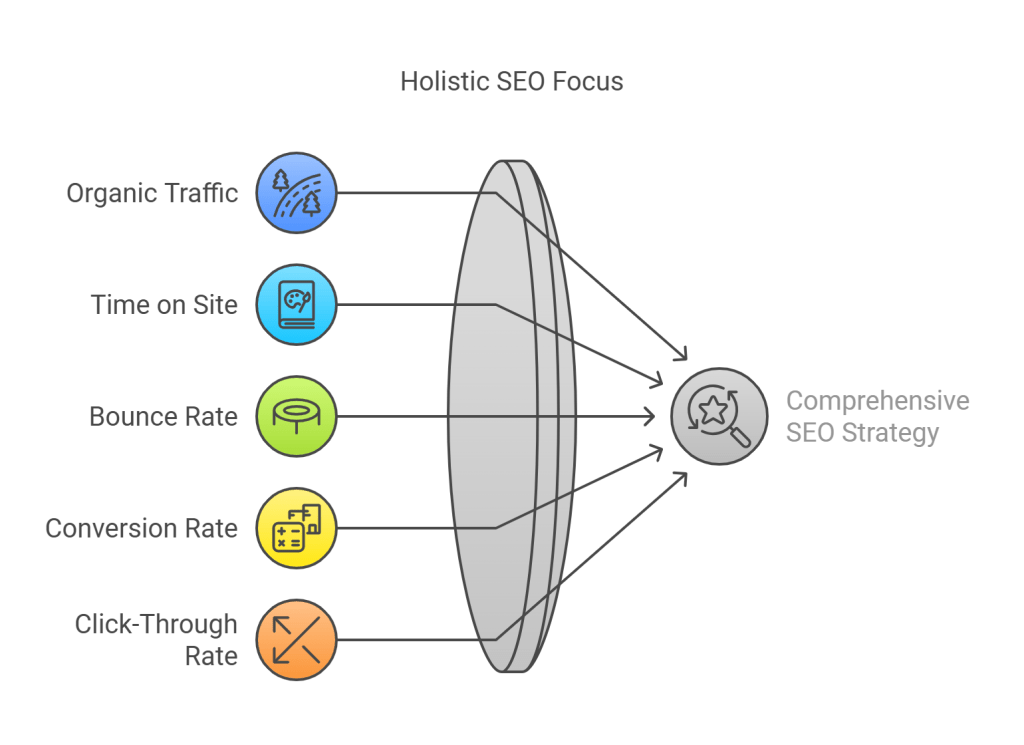
Fictional Case Study
Let’s take a look at a fictional small business, “GreenEarth Landscaping,” to illustrate how SEO mistakes can hurt rankings and how fixing them can lead to improvements.

The Problem:
GreenEarth Landscaping, a small landscaping business based in Dallas, had a beautiful website but struggled to attract traffic or rank for important keywords like “Dallas landscaping services” or “best lawn care in Dallas.” The owner, Lisa, realized that her website wasn’t bringing in the leads she needed.
Key SEO Mistakes:
- Ignoring Mobile Optimization: The website wasn’t mobile-friendly, which meant users on mobile devices bounced quickly.
- Poor Keyword Research: Lisa was targeting broad keywords like “landscaping” instead of specific long-tail keywords that matched local intent.
- No Local SEO: The website didn’t mention the business’s location prominently, and Lisa hadn’t set up a Google My Business profile.
- Low-Quality Content: The content on the site was sparse and didn’t answer common customer questions.
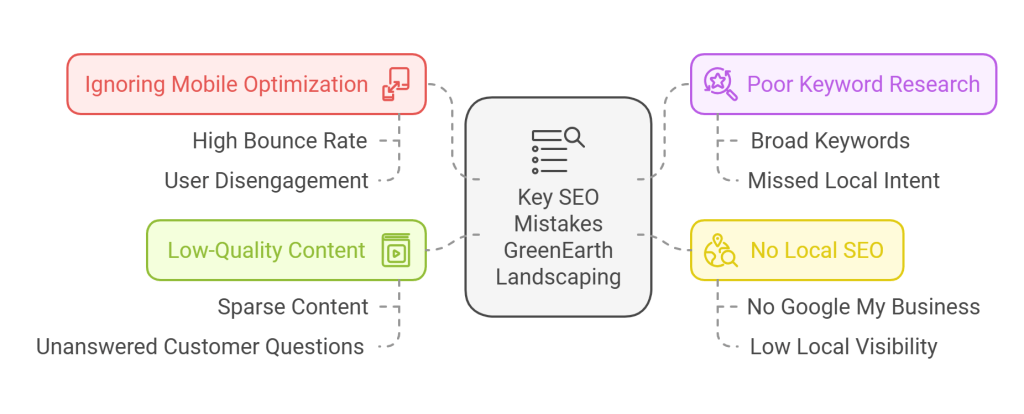
The Fix:
- Mobile Optimization: Lisa hired a developer to make her website responsive, ensuring it was mobile-friendly and passed Google’s Mobile-Friendly Test.
- Keyword Research: She conducted keyword research and found long-tail keywords like “affordable Dallas lawn care” and “eco-friendly landscaping Dallas.” She updated her content to reflect these new keywords.
- Local SEO: Lisa set up a Google My Business profile, added her location to her website, and encouraged customers to leave reviews. She also included her business’s location in title tags and meta descriptions.
- Content Upgrade: She added blog posts answering common landscaping questions, such as “How to prepare your lawn for winter in Dallas” and “Best native plants for Texas gardens,” improving her site’s relevance and engagement.
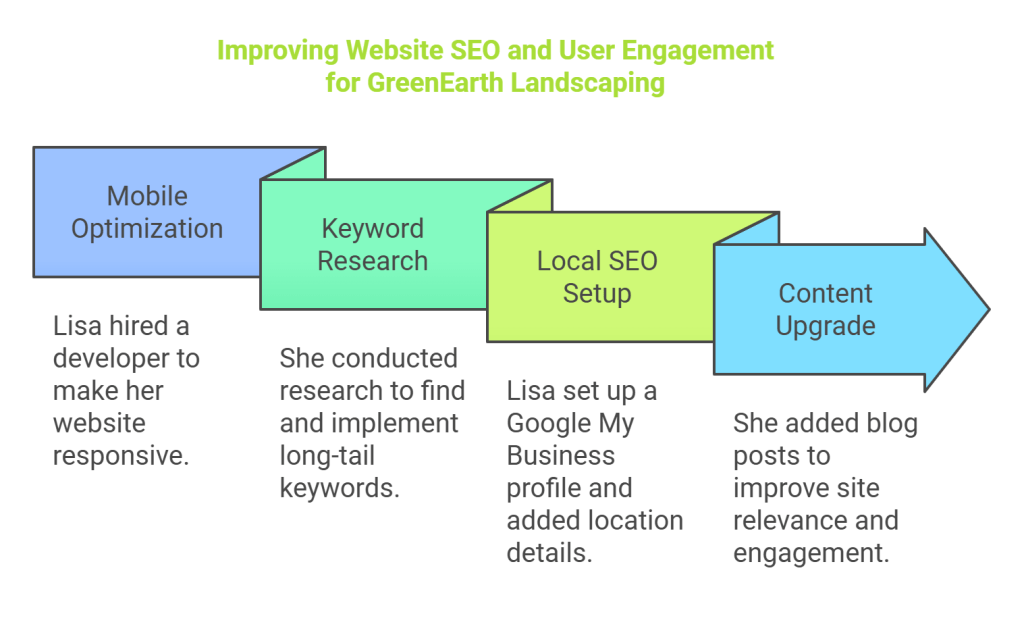
The Results:
Within six months, GreenEarth Landscaping saw a significant improvement. The website began ranking on the first page for several local search terms, organic traffic increased by 45%, and Lisa’s inquiries for services doubled. By fixing her SEO mistakes, Lisa not only improved her rankings but also built a more engaged and loyal customer base.
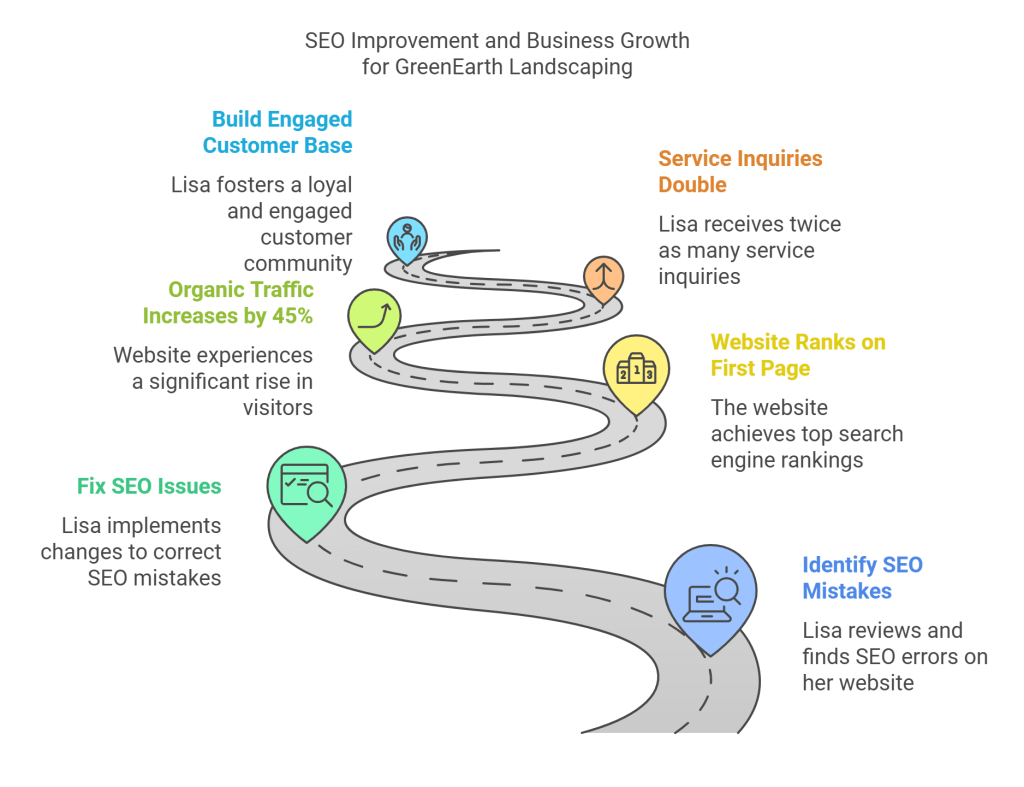
Overcoming Challenges and Future SEO Considerations
Challenge 1: Algorithm Updates
One of the ongoing challenges of SEO is keeping up with algorithm updates from Google and other search engines. What works today may not work tomorrow. To overcome this, always stay informed about SEO trends and adapt your strategy accordingly.
Challenge 2: Competition
For small businesses in competitive markets, outranking large competitors can feel like an uphill battle. Focus on local SEO, long-tail keywords, and creating niche content to carve out your space.
Challenge 3: Time and Resources
SEO is a long-term investment, and for small businesses with limited time and resources, it can be challenging to maintain consistency. Consider outsourcing tasks like content creation or technical SEO if necessary.
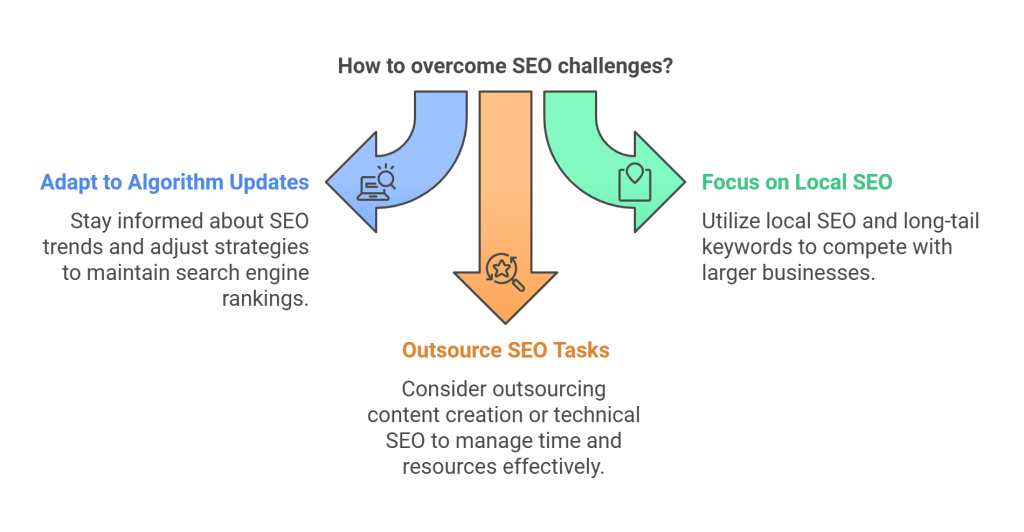
Conclusion: Avoiding SEO Mistakes to Maximize Growth
SEO is a powerful tool for small businesses, but common seo mistakes can undermine its potential. By addressing issues like mobile optimization, local SEO, content quality, and keyword placement, you’ll build a site that search engines reward and users enjoy.
A holistic strategy centered on technical optimization, engaging content, user experience, and balanced backlink building helps boost traffic and drive conversions. Consistent monitoring of your analytics also reveals which efforts deliver the strongest results, allowing you to refine tactics and maintain an edge. With a well-rounded, adaptable approach, SEO supports long-term business growth.
Further reading
Enge, Eric, Stephan Spencer, and Jessie Stricchiola. The Art of SEO. 3rd ed. Sebastopol, CA: O’Reilly Media, 2015.
https://www.amazon.com/Art-SEO-Mastering-Search-Optimization/dp/1491948965
Google. “Search Engine Optimization (SEO) Starter Guide.” Google Search Central.
https://developers.google.com/search/docs/beginner/seo-starter-guide
Patel, Neil. “SEO in 2023: New Strategies, Tips & Tools.” YouTube video, 2023.
https://www.youtube.com/watch?v=ODgkGcwFZeI
Clarke, Adam. SEO 2023: Learn Search Engine Optimization with Smart Internet Marketing Strategies. CreateSpace Independent Publishing Platform, 2023.
https://www.amazon.com/SEO-2023-Search-Optimization-Marketing/dp/1494922004
Moz. “Beginner’s Guide to SEO.” Moz Articles.
https://moz.com/beginners-guide-to-seo
Fishkin, Rand. Lost and Founder: A Painfully Honest Field Guide to the Startup World. New York: Portfolio, 2018.
https://www.amazon.com/Lost-Founder-Painfully-Startup-World/dp/0735213321
SEMrush. “How to Perform an SEO Audit.” YouTube video, 2022.
https://www.youtube.com/watch?v=dJ2BjJzaKwA
HubSpot. “On-Page vs. Off-Page SEO: What’s the Difference?” HubSpot Blog, 2023.
https://blog.hubspot.com/marketing/on-page-vs-off-page-seo







